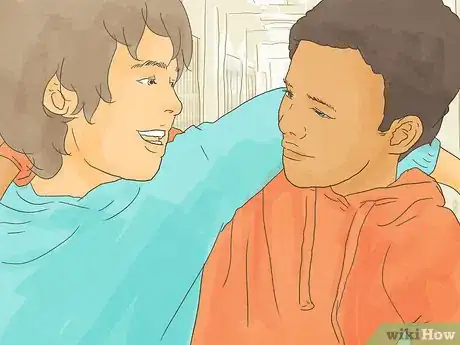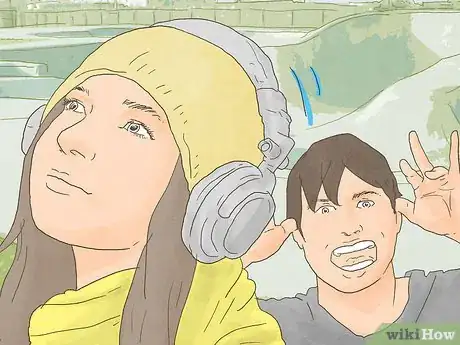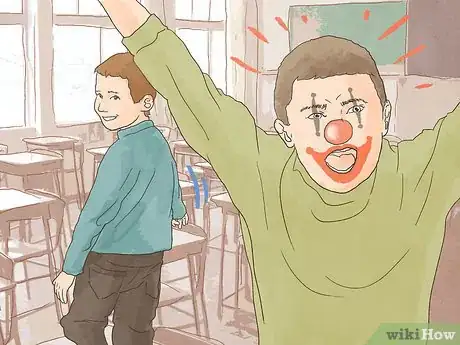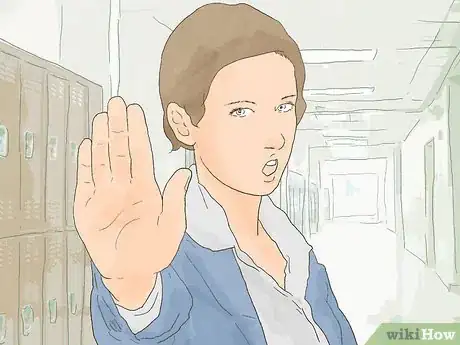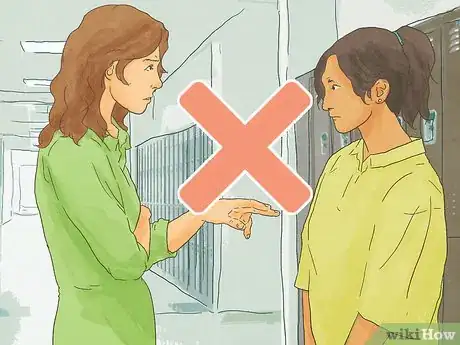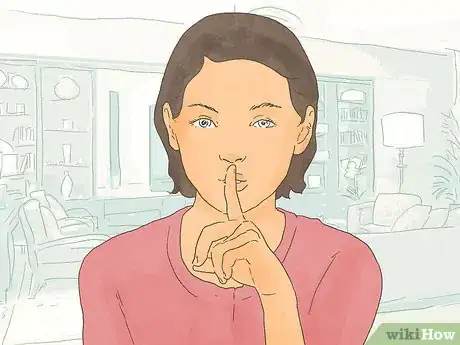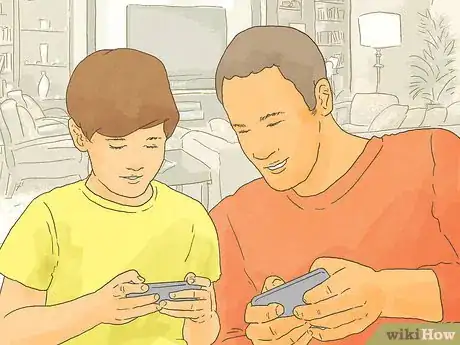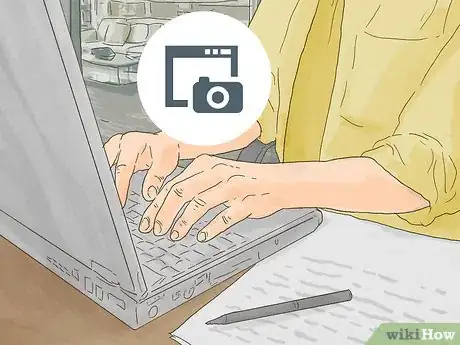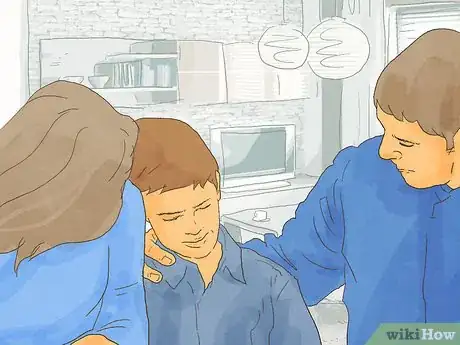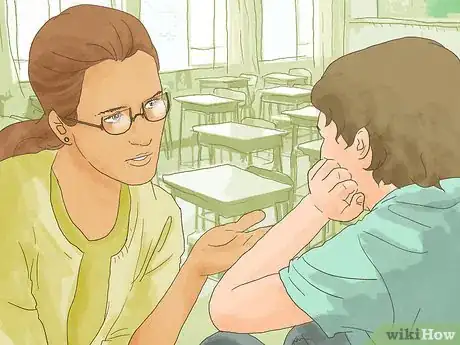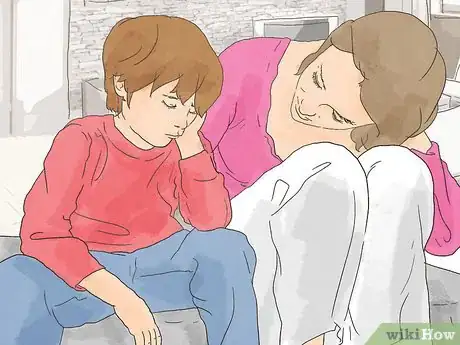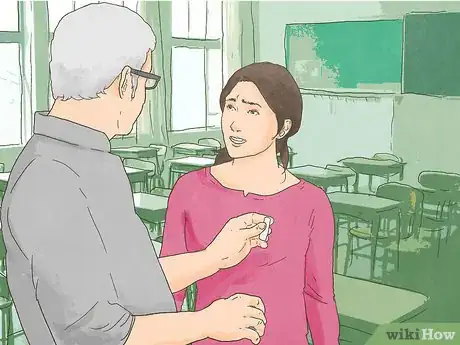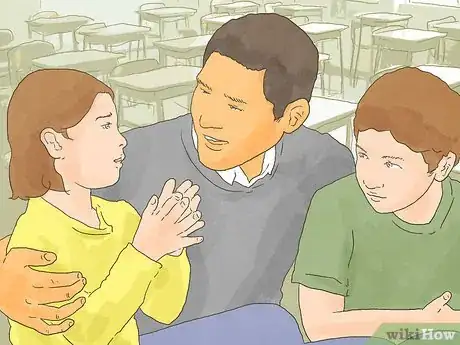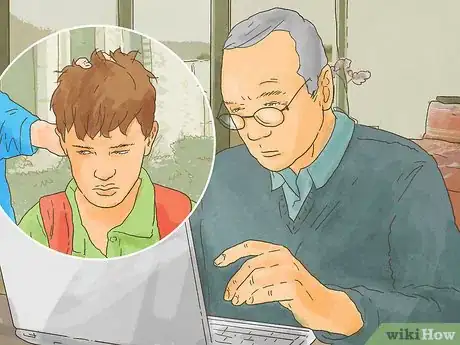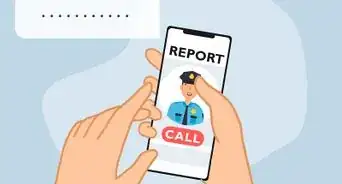This article was co-authored by Klare Heston, LCSW. Klare Heston is a Licensed Independent Clinical Social Worker based in Cleveland, Ohio. With experience in academic counseling and clinical supervision, Klare received her Master of Social Work from the Virginia Commonwealth University in 1983. She also holds a 2-Year Post-Graduate Certificate from the Gestalt Institute of Cleveland, as well as certification in Family Therapy, Supervision, Mediation, and Trauma Recovery and Treatment (EMDR).
This article has been viewed 24,282 times.
Starting at a new school can be tough, especially if you’re being bullied. Bullying can be hard to deal with, but there are things you can do to stop bullies from picking on you. By surrounding yourself with friends, figuring out ways to stay away from the bully, and learning how to deal with the bully on your own, you can usually get the bully to stop and leave you alone. If those things don’t work, however, telling an adult can help stop the bully.
Steps
Preventing a Run-In with a Bully
-
1Avoid the bully. You may not always be able to stay away from someone who is bullying you, but there are some things you can do to try and keep from running into them. First of all, try to avoid places you know they will be. For example, if they are outside their locker at the end of the school day, take a different route that will keep you from passing them. Or, hang out in your classroom for a few extra minutes until they’ve left school for the day.
- While it’s okay to make changes in your daily routine to avoid your bully, don’t ever hide or skip class to get away from them.[1]
- It is okay to avoid the bully now and then to minimize conflict, but if you are changing your entire routine, then you may be fueling the bullying. Avoid making drastic changes to avoid the bully.
-
2Make new friends. Being the new kid at school can sometimes make you an easy target for bullies because they think you probably don’t have many friends to back you up yet. Work on making friends at your new school so you have a good support system to help you deal with the bully. You’ll probably make friends just by being yourself and being confident, but if you’re having trouble making new friends, try to do some of the following things:
- Smile at your classmates and be friendly to everyone. You might not know where you fit in at a new school for a while so it is important to talk to everyone so you can figure out which kids you have fun being around and have a lot in common with.
- Joining clubs and organizations you’re interested in can also help you make friends. This is a good way to find people with the same hobbies and interests as you.
- If the other kids are talking about getting together to do an activity you like and are good at, ask them if you can join. For example, if they are talking about going bowling over the weekend, you could say, “I love bowling, too. Can I come with you guys? It sounds like fun!”[2]
Advertisement -
3Walk with a buddy. Walking with a friend can help keep a bully from bothering you. When you’re by yourself, you might seem like an easy target. If you’re walking with a friend, however, the bully might not be confident enough to deal with both of you. Make plans with a friend to walk to and from classes or to the bus after school.
- Do the same for any other kids that are being bullied. Not only will you help keep them from being picked on, but they’ll be more likely to do the same for you when you need them to.[3]
-
4Stand tall and act brave. A bully might also be more likely to leave you alone if you act like you’re not afraid of them. To do this you don’t have to say anything to them, just stand up tall and act confident.
- If you have trouble being confident, try doing things that make you feel good about yourself. For example, wear a pair of shoes you love or get up a little earlier to do your hair the way you think it looks best.[4]
Dealing with a Bully Face-to-Face
-
1Ignore the bully. If you can, ignore the bully when they say or do something to you. If the bully fails to get the reaction they want from you, they may lose interest and leave you alone. The following methods can help you ignore a bully:
- Try to walk away when they come up to you before they say or do anything. Pretend that you are walking away from a friend so your body language (which you’re probably unaware of) doesn’t make it look like you’re scared.
- Think about something else, like what you’re going to do with your friends this weekend or what you have to do for homework.
- Come up with a sentence you can repeat to yourself when a bully approaches you that will keep you from being afraid. Try saying something like, “He’s just another kid. He eats, sleeps, and lives the same way I do.”[5]
-
2Use visualization. You can also use visualization to help keep yourself calm around a bully. This means that you picture things in your head that make you feel safe and protected. Here are some visualizations to try:
- Build a wall around yourself in your mind. When the bully says something mean, just picture their insults bouncing off the wall you’ve created.
- You can also try visualizing the bully in a funny way. For example, visualize them with three eyes or dressed in a silly outfit. This can help them seem less intimidating.[6]
-
3Tell them to stop. When a bully says or does something mean to you, telling them in a confident voice to stop might help. They are probably not expecting you to stand up for yourself so this might be enough to make them lose interest and stop bullying you. If you find yourself in a situation where you’re being bullied, simply yell “Stop!” and walk away from the bully. Don’t turn back around no matter what they say.[7]
-
4React like you don’t care. Bullies often keep picking on someone because the way they react makes the bully feel powerful or superior to the other person. If you can react to their comments like it doesn’t bother you (even if it really does), the bully might leave you alone because you aren’t reacting how they want.
- For example, if a bully tells you your shoes are ugly, just start laughing and say, “I know they are!” Then walk away from the bully without saying anything else.
- Some other lines you can use when a bully says something mean to you are: “Whatever!” “I’m not sure why you keep saying these things about me, but I don’t care,” or “Wow, did you come up with that all by yourself?”[8] Making these kinds of comments can help to defuse the situation and take some of the power away from the bully.
-
5Walk away. It is really important that, no matter what, you walk away after you show the bully you don’t care. By turning around and walking away, you’re taking the power away from the bully. You won’t be giving them the reaction they want so they’ll lose interest in picking on you.[9]
-
6Don’t bully back. No matter how much they are bothering you, don’t ever hit, kick, or punch a bully. This is the reaction they want from you. In addition, you might get in trouble for hitting them, even if they started it. You should also keep from saying mean or hurtful things back to them. It might seem like it’s okay to be mean to someone if they have been bullying you, but bullying is always wrong and never justified.[10]
Preventing and Stopping Cyberbullying
-
1Think about what you post. Bullying doesn’t always happen in person. In today’s world, cyberbullying is also something people have to deal with. Like regular bullying, however, there are ways to prevent and stop cyberbullying. First, be conscious of what you post online. Don’t post anything that you don’t want shared with everyone you know. If it could be embarrassing or hurtful to you or others, don’t post it.
- Always remember, absolutely nothing you post online is private. Take a minute to think about all the people who might look at your post or picture, including your friends, classmates, teachers, parents, and even strangers.[11]
-
2Keep your passwords secret. It is also important to keep your passwords for your social media accounts to yourself. Giving someone your password allows them to access your account and post whatever they want, which could be something hurtful to you or another person.
- The only people you should give your password to are your parents.[12]
-
3Keep your parents informed. Your parents can help you decide what you should and shouldn’t post online, so let them know what you’re doing and who you’re doing it with. They have your best interests in mind and want to keep you from opening yourself up to being cyberbullied.[13] In addition, they can help you figure out how to get rid of the unwanted post and help you block the person so they can no longer communicate with you online.[14]
- You may also consider asking an older sibling if you don’t feel ready to talk to your parents about it. If your sibling was also bullied, then they may be able to give you some feedback.
-
4Don’t respond. Sometimes, no matter how careful you are, cyberbullies still get to you. If you’re being bullied online, never respond. Responding to a mean comment or post might only make things worse and give the bully more fuel to keep bullying you.[15]
-
5Keep a record of online bullying. It is always good to keep a record of any online bullying that is going on. Documenting when someone is bullying you can make it easier to let your parents or another adult know exactly what happened. If you can show them exactly what the bully said or did, they can help you figure out the best way to deal with it.[16]
- There are a few ways you can document online bullying. You can print out the post or email that contains the nasty content, or save it to a file on your computer. In addition, you can take a screenshot of the text, post, or message on your phone.
- Always remember that if the bullying gets intense, seek help. It is better to seek help early rather than wait.
Getting Help to Stop Bullying
-
1Tell your parents. Sometimes you can’t stop a bully on your own. If they are physically hurting you or won’t stop picking on you even after you’ve tried to get them to stop on your own, you need to tell an adult about what they are doing. Let your parents know what is going on at school. They can help figure out the best person for you to talk to at school and can help you decide how to approach them. They can also help you figure out and practice the best ways to deal with the bully until the issue is resolved.[17]
-
2Tell a teacher. Teachers are there to make sure you stay safe and aren’t being treated badly by anyone, even if you’re a new student. They are a good person to tell about bullying and will usually be able to resolve the issue quickly.[18]
- When you talk to your teacher about your situation, try saying something like, “Mark has been calling me mean names and pushing me in the lunch line. Can you help me get him to stop?”
- While any teacher at your school should help you, you might feel more comfortable talking to certain ones. Tell the teacher you feel most at ease around. Feeling comfortable will make it easier for you to talk to them about your problem.
-
3Tell another adult. If you think the first person you told didn’t believe you or if nothing is happening after telling them about the bully, ask another adult for help. This person can be a different teacher, a coach, your school principal, or a guidance counselor. Don’t be discouraged if you don’t get the help you need right away. If the first person you told wasn’t able to help you, one of these people should be able to. Bullying is never okay and you should keep talking to the adults at your school about it until it stops.[19]
-
4Come up with a plan. It can be difficult to talk to an adult about bullying, especially in a new school. To make this easier, come up with a plan on how you will approach them before you do. Decide who you feel most comfortable talking to, when is the best time to talk to them, and what you are going to say. Going in with a solid plan can make things much easier.
- For example, think about who your favorite teachers are so far and why. You might decide to talk to your gym teacher because he is always nice and he always asks you about your favorite sports teams.
- When you’re deciding when the best time to talk is, think about when you’ll have enough time and how you’ll feel after the meeting. For instance, asking to talk after school might be best because you’ll have as much time as you need to talk about your problems and you won’t have to go right back to class if you’re feeling upset after the meeting.
- Plan out what you are going to say by writing it down or practicing it over and over before you talk to an adult. This will help you feel more confident and ensure you can explain everything clearly and without forgetting important details.
-
5Bring a friend or parent. If you’re nervous about talking to a new teacher, principal, guidance counselor, or coach, try bringing a friend or your parents with you. It might make you feel more at ease having someone you feel safe and comfortable around there with you, which can make it easier to talk about your problems.
- In addition, your friend might be able to back up your story and help you tell the adult what happened.
- Your parents can help make sure your teacher understands everything that happened and can work with them to figure out what to do next.[20]
-
6Find a different way to communicate. It can be tough to talk about bullying. If you think you might be too nervous to speak about your problem, try communicating a different way. For example, you can write a note that describes what happened, when it happened, and who it happened with. Tell the adult you’ve been having a problem and that you’ve written down what happened, and then give them the note. This will make it easier to open up a conversation with the adult so you can get help to stop the bully.
- You can also send an email, use an instant messaging system if your new school has one, or drop a note in your teacher, principal, or guidance counselor’s mailbox. Any of these methods will work to open up a conversation about the problems you’ve been having with a bully.[21]
Expert Q&A
-
QuestionWhat is a bully?
 Klare Heston, LCSWKlare Heston is a Licensed Independent Clinical Social Worker based in Cleveland, Ohio. With experience in academic counseling and clinical supervision, Klare received her Master of Social Work from the Virginia Commonwealth University in 1983. She also holds a 2-Year Post-Graduate Certificate from the Gestalt Institute of Cleveland, as well as certification in Family Therapy, Supervision, Mediation, and Trauma Recovery and Treatment (EMDR).
Klare Heston, LCSWKlare Heston is a Licensed Independent Clinical Social Worker based in Cleveland, Ohio. With experience in academic counseling and clinical supervision, Klare received her Master of Social Work from the Virginia Commonwealth University in 1983. She also holds a 2-Year Post-Graduate Certificate from the Gestalt Institute of Cleveland, as well as certification in Family Therapy, Supervision, Mediation, and Trauma Recovery and Treatment (EMDR).
Licensed Social Worker A bully is a person who uses their size, meanness, or influence to demean, hurt, or intimidate others. They thrive on the other person's reaction and the reaction of others in the surrounding area.
A bully is a person who uses their size, meanness, or influence to demean, hurt, or intimidate others. They thrive on the other person's reaction and the reaction of others in the surrounding area. -
QuestionHow can primary school prevent bullying?
 Klare Heston, LCSWKlare Heston is a Licensed Independent Clinical Social Worker based in Cleveland, Ohio. With experience in academic counseling and clinical supervision, Klare received her Master of Social Work from the Virginia Commonwealth University in 1983. She also holds a 2-Year Post-Graduate Certificate from the Gestalt Institute of Cleveland, as well as certification in Family Therapy, Supervision, Mediation, and Trauma Recovery and Treatment (EMDR).
Klare Heston, LCSWKlare Heston is a Licensed Independent Clinical Social Worker based in Cleveland, Ohio. With experience in academic counseling and clinical supervision, Klare received her Master of Social Work from the Virginia Commonwealth University in 1983. She also holds a 2-Year Post-Graduate Certificate from the Gestalt Institute of Cleveland, as well as certification in Family Therapy, Supervision, Mediation, and Trauma Recovery and Treatment (EMDR).
Licensed Social Worker The school can have discussions/training about bullying. Also, they can come down hard with suspensions in cases of bullying. A zero tolerance policy usually works best, not a slap on the wrist.
The school can have discussions/training about bullying. Also, they can come down hard with suspensions in cases of bullying. A zero tolerance policy usually works best, not a slap on the wrist. -
QuestionHow do you stop people from picking on you?
 Klare Heston, LCSWKlare Heston is a Licensed Independent Clinical Social Worker based in Cleveland, Ohio. With experience in academic counseling and clinical supervision, Klare received her Master of Social Work from the Virginia Commonwealth University in 1983. She also holds a 2-Year Post-Graduate Certificate from the Gestalt Institute of Cleveland, as well as certification in Family Therapy, Supervision, Mediation, and Trauma Recovery and Treatment (EMDR).
Klare Heston, LCSWKlare Heston is a Licensed Independent Clinical Social Worker based in Cleveland, Ohio. With experience in academic counseling and clinical supervision, Klare received her Master of Social Work from the Virginia Commonwealth University in 1983. She also holds a 2-Year Post-Graduate Certificate from the Gestalt Institute of Cleveland, as well as certification in Family Therapy, Supervision, Mediation, and Trauma Recovery and Treatment (EMDR).
Licensed Social Worker First, don't react as much. The bully is usually in it for your reaction. Shrug your shoulders and walk away. Keep a buddy close by.
First, don't react as much. The bully is usually in it for your reaction. Shrug your shoulders and walk away. Keep a buddy close by.
References
- ↑ http://kidshealth.org/en/kids/bullies.html#
- ↑ http://www.thefriendshipblog.com/15-ways-to-make-friends-at-a-new-school/
- ↑ http://kidshealth.org/en/kids/bullies.html#
- ↑ http://kidshealth.org/en/kids/bullies.html#
- ↑ http://us.reachout.com/facts/factsheet/what-to-do-if-you-are-being-bullied
- ↑ http://us.reachout.com/facts/factsheet/what-to-do-if-you-are-being-bullied
- ↑ https://www.stompoutbullying.org/how-to-deal-with-bullies
- ↑ https://www.stompoutbullying.org/how-to-deal-with-bullies
- ↑ https://www.stompoutbullying.org/how-to-deal-with-bullies
- ↑ http://kidshealth.org/en/kids/bullies.html#
- ↑ https://www.stopbullying.gov/kids/what-you-can-do/
- ↑ https://www.stopbullying.gov/kids/what-you-can-do/
- ↑ https://www.stopbullying.gov/kids/what-you-can-do/
- ↑ https://www.stompoutbullying.org/how-to-deal-with-bullies
- ↑ https://www.stompoutbullying.org/how-to-deal-with-bullies
- ↑ https://www.stompoutbullying.org/how-to-deal-with-bullies
- ↑ http://kidshealth.org/en/kids/bullies.html#
- ↑ https://www.stompoutbullying.org/how-to-deal-with-bullies
- ↑ https://www.stompoutbullying.org/how-to-deal-with-bullies
- ↑ http://us.reachout.com/facts/factsheet/what-to-do-if-you-are-being-bullied
- ↑ http://us.reachout.com/facts/factsheet/what-to-do-if-you-are-being-bullied


